EQUUS provides the latest information from the world's top veterinarians, equine researchers, riders and trainers on understanding and influencing equine behavior, recognizing the warning signs of illness and disease, and solving riding and training problems.
Equus
FOCUS: VACCINES • When it comes to keeping your horse healthy, you can’t do much better than implementing a proper vaccination plan.
FOCUS: BIOSECURITY • Simple precautions and a crisis plan can reduce the threat of contagious diseases.
FOCUS: NUTRITION
OUR DEWORMING ARSENAL
FOCUS: PARASITE CONTROL • Targeted deworming not only saves money but helps ensure the continued effectiveness of our anthelmintics.
COMMON INTERNAL PARASITES AFFECTING HORSES
FOCUS: SOUNDNESS • Following some simple rules will help to keep your horse’s bones, muscles and soft tissues in good working order.
FEEDING YOUNG HORSES FOR SOUNDNESS
FOCUS: HEALTHY HOOVES • Every aspect of your horse’s management—from the feeds to footing—can have a significant effect on his hooves.
INSPECT YOUR HORSE’S HOOVES
FOCUS: DIGESTIVE CARE • Reduce your horse’s risk for colic, ulcers and other gastrointestinal troubles with commonsense management.
GASTRIC ULCERS: A COMMON PROBLEM
FOCUS: RESPIRATORY HEALTH • Many of the measures that help keep horses with heaves comfortable can also benefit the entire herd.
THE DANGERS OF DUSTY FOOTING
EQUUS • What to do until the veterinarian arrives
LARGE LACERATION • As you wait for the veterinarian to tend to your horse’s large open wound, keep him calm, slow the bleeding and scope out a suitable treatment area.
HOW BAD IS IT?
TENDON INJURIES
CHOKE • As you wait for your veterinarian, keep a horse with choke as calm as possible. Watch him carefully but resist the urge to intervene.
CHOKE
HIVES • If your horse develops this allergic reaction, keep him comfortable, watch his breathing closely and begin to gather clues that might help pinpoint the cause.
HIVES
HOOF BRUISES • Although hoof bruises usually aren’t serious, they can put a crimp in your riding plans. Here’s how you can protect against them.
RUNNY NOSE • When your horse has suspicious nasal discharge, take steps to contain contagion and collect clues to the source of the trouble.
DISCHARGE ID
HEAT EXHAUSTION • When a horse is overcome by heat, your primary and urgent task while waiting for the veterinarian is to lower his body temperature. Then you’ll monitor him for signs of improvement and encourage him to drink.
HEAT EXHAUSTION
OBESITY • Excess fat can compromise your horse’s health. But a few commonsense measures will help keep his weight in check.
TYING UP • When your horse has the severe muscle cramping known as tying up, do your best to keep him still and comfortable while you wait for the veterinarian.
TYING UP
Reduce your horse’s risk of tying up • With adjustments to a horse’s diet and exercise program you can reduce his chances of experiencing this painful muscle condition.
COLIC • While waiting for your veterinarian, you’ll have four goals: Keep your horse comfortable, prevent his condition from worsening, collect information to aid diagnosis and prepare for a possible trip to a referral hospital.
COLIC
ARTHRITIS
RESPIRATORY DISTRESS • When a horse is having difficulty breathing, get him fresh air, keep him as calm as possible and monitor his vital signs as you wait for the veterinarian.
HEAVES
SWOLLEN LEG • When waiting for your veterinarian to come tend to your horse’s grossly fat leg, gather clues that can...
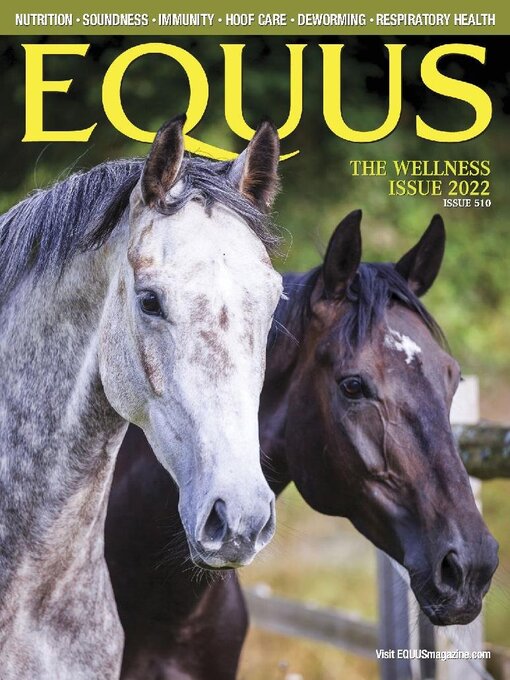
 Spring 2025
Spring 2025
 Winter 2024
Winter 2024
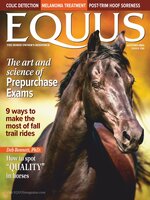 Fall 2024
Fall 2024
 Summer 2024
Summer 2024
 Spring 2024
Spring 2024
 Winter 2023
Winter 2023
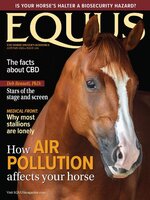 Fall 2023
Fall 2023
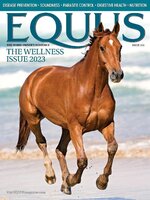 Wellness 2023
Wellness 2023
 Summer 2023
Summer 2023
 Spring 2023
Spring 2023
 Winter 2022
Winter 2022
 Fall 2022
Fall 2022
 Wellness Issue 2022
Wellness Issue 2022
 Summer 2022
Summer 2022
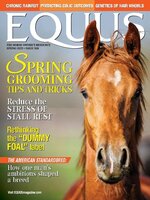 Spring 2022
Spring 2022
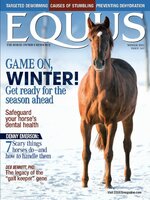 Winter 2021
Winter 2021